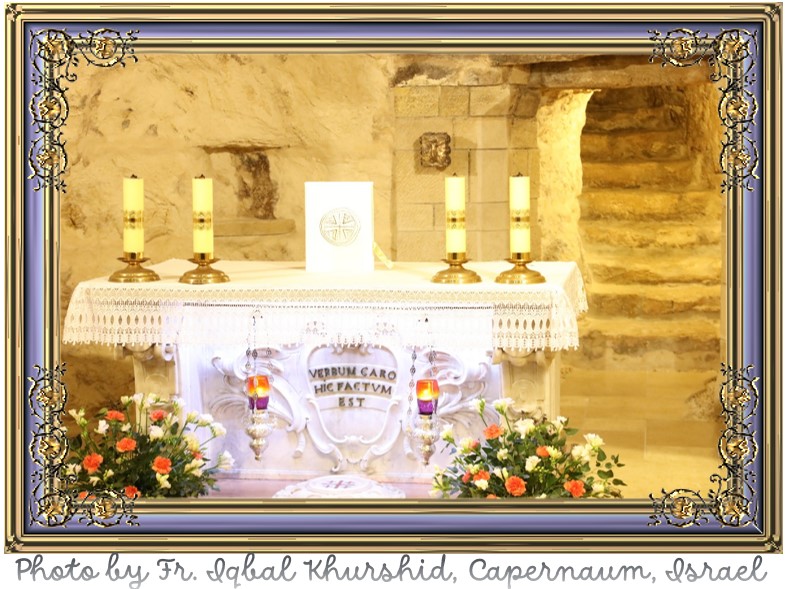
16th Sunday in Ordinary Time Year C ~ July 17, 2022
HOSPITALITY: WORK OF LOVE
I love the Scripture reference from the Letter to Hebrews (13:1-6): “Let mutual love continue. Do not neglect to show hospitality to strangers, for by doing that some have entertained angels without knowing it. Remember those who are in prison, as though you were in prison with them; those who are being tortured, as though you yourselves were being tortured. Let marriage be held in honor by all and let the marriage bed be kept undefiled; for God will judge fornicators and adulterers. Keep your lives free from the love of money and be content with what you have; for he has said, “I will never leave you or forsake you.” So, we can say with confidence, “The Lord is my helper; I will not be afraid. What can anyone do to me?” This reference not only encourages us to extend our hospitality to others but also reminds about the reward waiting for us. The value of Hospitality is part and parcel of our life however in Christianity it has received the highest place because God’s hospitality is, where every person is welcomed into the Kingdom of God, the banquet of divine love, which is the very life of the Church. (Please read Matthew 23-25 chapters). The value of hospitality emerges out of actions even if they are little but have huge impact on other people. The following story will help us to understand the really meaning of our love shown through hospitality.
There was a young clerk in a hotel who was on duty one, not so pleasant, night. All the rooms had been allocated when an older gentleman came in rather late and weather-beaten. He enquired cheerfully if there was a vacant room. The clerk mentioned it had been a busy night and he thought that all the rooms were taken but he would double-check. After a time, he said. “However, I believe there is a small room available, if you don’t mind the simplicity.” The guest was most welcome. Generous hospitality indeed as the room was the clerk’s own humble resting place. He was really surprised when he was invited by the guest, as he was leaving, to visit him in a large city when next he had some free time. “I am sure you will enjoy the visit.” he said. Later the offer was taken up to visit this kind gentleman. The clerk found the area and then the address which was another hotel. He met with the older gentleman who revealed to him that he was the owner of a chain of hotels and had been looking for a new manager for his new one. He then offered the position to the clerk. He said that he had known straight away when he met the clerk that stormy evening – he had found a person who understood the essence of generous hospitality.
Rosaria Butterfield (PhD, Ohio State University) has some beautiful insights about the Christian Hospitality.
- Hospitality reflects the gospel. Faithful Christians are—and have always been—a strange minority in a hostile world. Redeemed by Christ, we have lost our old lives—and with our lives, we have left behind the history, identity, and people who once claimed us. Conversion starts with the sacrifice of what once was, and the gospel provides for what we have relinquished through hospitality. (Please read Mark 10: 28–30). Hospitality is the ground zero of the Christian life.
- Hospitality is spiritual warfare. Hospitality that gathers brothers and sisters alongside unsaved neighbors and strangers isn’t charity or kindness; rather, it takes the gospel upstream of the culture war—where it belongs—and shakes the very gates of heaven for the souls of our neighbors. (Please read Acts of Apostle 4:32-37)
- Hospitality makes room for different kinds of hosts and guests. Every Christian is called to practice hospitality, but that does not mean that everyone practices it in the same way. We practice hospitality by sharing our resources and our needs, by serving as both host and guest, as Jesus did when he walked this earth.
- Hospitality is the Benedict option on mission. St. Benedict, the 6th century father of western monasticism whose response to the collapse of Roman civilization helped preserve the Christian faith, has received renewed attention with Rod Dreher’s 2017 publication ofThe Benedict Option: A Strategy for Christians in a Post-Christian Nation. We Butterfields practice almost-daily hospitality, including table fellowship, Bible reading, psalm singing, and prayer. This comes out in the wash as Benedict option on mission. The invitation is wide open, and sometimes we spill into three rooms. Dining nightly with brothers and sisters from the church has developed deep familial bonds. Over the years, we have learned how to help each other without being asked. We are a set-apart people. We love the church, and we extol her virtues, and we call others to come into God’s family. Hospitality is good for the giver because it puts our lives and hearts on display.
- Hospitality requires unity in the church. If the church felt the priority of our brotherhood and sisterhood over and against our fleshly identities, we too would make hospitality a priority. Christian unity would shift our focus from programs to relationships. We would see our lack of vibrant, regular, and distinctive hospitality as the dirty, rotten sin that it is.
- Hospitality nurtures and grows the family of God. The church is God’s family, and we should live in daily community. Nourishing the family of God and compelling those outside of God’s favor to come to your table are the twin heartbeats of hospitality.
- Hospitality is good for the giver. Hospitality puts our lives and hearts on display. We see our selfish ambition and our pride. When we see our own sin clearly, when we confess and repent of sin daily, then we are ready with a clean conscience to hold material things lightly and people dearly. Hospitality is good for the giver because it puts our lives and hearts on display. It compels us to confess and repent, to live below our means, and to build in margin time for the unexpected needs of others.
- Daily hospitality is good for the children. It’s good for children to watch their parents living the gospel in regular, nightly table fellowship. They watch you warmly embrace neighbors who think differently than you do, and they hope that maybe, just maybe, their secrets are safe with you. Your children behold that Jesus really is King and really is alive, and that he isn’t just some prop you pull out on Sunday morning or for youth group. (Please read Mark 10:13-16) to see the hospitality of Jesus shown towards the children).
In the First Reading we could see the humility and love of Abraham shown towards three men through hospitality and at the end he is given good news of a son. He shows hospitality to strangers, and we can raise a question; why Abraham is so eager to see these strangers? He is sitting under a tree, and likely pondering how it will be possible for Sarah and him to have a child, as God has just rather promised in the previous chapter (17:16). At the end of that chapter Abraham had fulfilled his part of the covenant by having his whole household, including himself, circumcised (17:26-27). Not only does Abraham leap to his feet and runs but the first words out of his mouth beseech the visitors to allow him to care for them: “My lord, if I find favor with you, do not pass by your servant”. Abraham has received a seemingly impossible promise, but his animated efforts on behalf of these strangers under adverse conditions suggest that he still trusts that God can and will do the impossible.
A popular speaker started off a seminar by holding up a $20 bill. A crowd of 200 had gathered to hear him speak. He asked, “Who would like this $20 bill?”
200 hands went up.
He said, “I am going to give this $20 to one of you but first, let me do this.” He crumpled the bill up.
He then asked, “Who still wants it?”
All 200 hands were still raised.
“Well,” he replied, “What if I do this?” Then he dropped the bill on the ground and stomped on it with his shoes.
He picked it up and showed it to the crowd. The bill was all crumpled and dirty.
“Now who still wants it?”
All the hands still went up.
“My friends, I have just showed you a very important lesson. No matter what I did to the money, you still wanted it because it did not decrease in value. It was still worth $20. Many times, in our lives, life crumples us and grinds us into the dirt. We make bad decisions or deal with poor circumstances. We feel worthless. But no matter what has happened or what will happen, you will never lose your value. You are special – Don’t ever forget it! Be there for other and your hospitality will make you special.
I do believe that’s 100% true because when we read the Sacred Scripture we come to know about our value and the presence of the Lord. God through the salvation history has shown his hospitality by inviting everyone closer to him. “The Lord will shower down blessings, and our land will yield its increase”. These are the words of the Psalm. We are invited to celebrate this mysterious communion between God and his People, between God and us. In the Gospel today we see the hospitality of Mary & Martha as they welcome Jesus into their home. Jesus not only accepts their hospitality but also uses this event to teach us what is more important for us. The Church is a mother with an open heart. She knows how to welcome and accept, especially those in need of greater care, those in greater difficulty. The Church, as desired by Jesus, is the home of hospitality. And how much good we can do, if only we try to speak this language of hospitality, this language of receiving and welcoming. How much pain can be soothed, how much despair can be calmed in a place where we feel at home! This requires open doors, especially the doors of our heart. Welcoming the hungry, the thirsty, the stranger, the naked, the sick, the prisoner (Mt 25:34-37), the leper and the paralytic. Welcoming those who do not think as we do, who do not have faith or who have lost it. And sometimes, we are to blame. Welcoming the persecuted, the unemployed. Welcoming the different cultures, of which our earth is so richly blessed. Welcoming sinners, because each one of us is also a sinner. Jesus always accepts our hospitality as he did of tax collectors and sinners in the Gospels because “See I am standing at the door and knocking and anyone who will open the door, I will come in to dine with him”.
In today’s Gospel Jesus who, on the way to Jerusalem, enters a village and is welcomed into the home of two sisters: Martha and Mary. Both welcome the Lord, but they do so in different ways. Mary sits at Jesus’ feet and listens to his, whereas Martha is completely caught up in preparing things; at a certain point she says to Jesus: “Lord, do you not care that my sister has left me to serve alone? Tell her then to help me”. Jesus responds to her: “Martha, Martha, you are anxious and troubled about many things; one thing is needful. Mary has chosen the good portion, which shall not be taken away from her”.
Holy Father Pope Francis reflects on the Gospel this way “In bustling about and busying herself, Martha risks forgetting — and this is the problem — the most important thing, which is the presence of the guest, Jesus in this case. She forgets about the presence of the guest. A guest is not merely to be served, fed, looked after in every way. Most importantly he ought to be listened to. Remember this word: Listen! A guest should be welcomed as a person, with a story, his heart rich with feelings and thoughts, so that he may truly feel like he is among family. If you welcome a guest into your home but continue doing other things, letting him just sit there, both of you in silence, it is as if he were of stone: a guest of stone. No. A guest is to be listened to. Of course, Jesus’ response to Martha — when he tells her that there is only one thing that needs to be done — finds its full significance in reference to listening to the very word of Jesus, that word which illuminates and supports all that we are and what we do. If we go to pray, for example, before the Crucifix, and we talk, talk, talk, and then we leave, we do not listen to Jesus. We do not allow him to speak to our heart. Listen: this is the key word. Do not forget! And we must not forget that in the house of Martha and Mary, Jesus, before being Lord and Master, is a pilgrim and guest. Thus, his response has this significance first and foremost: “Martha, Martha why do you busy yourself doing so much for this guest even to the point of forgetting about his presence? — A guest of stone! — Not much is necessary to welcome him; indeed, only one thing is needed: listen to him — this is the word: listen to him — be brotherly to him, let him realize he is among family and not in a temporary shelter”.
As I mentioned earlier hospitality, which is one of the works of love & mercy, is revealed as a truly human and Christian virtue, a virtue which in today’s world is at risk of being overlooked. Holy Father Pope Francis has an amazing way to encourage and challenge us when he reflects on the Gospel today and he says “I would like to ask you, to pose a question to you, each one answer in your own heart: do you, husband, take time to listen to your wife? And do you, woman, take time to listen to your husband? Do you, parents, take time, time to “waste”, to listen to your children? or your grandparents, the elderly? — “But grandparents always say the same things, they are boring…” — But they need to be listened to! Listen. I ask that you learn to listen and to devote more of your time. The root of peace lies in the capacity to listen”.
Are we sharing our Christian Faith through hospitality? If so, then I think we are going to get everything like the story below.
A woman came out of her house and saw three old men with long white beards sitting in her front yard. She did not recognize them. She said, “I don’t think I know you, but you must be hungry. Please come in and have something to eat.” “Is the man of the house home?” they asked. “No”, she said. “He’s out.” “Then we cannot come in”, they replied. In the evening when her husband came home, she told him what had happened. “Go tell them I am home and invite them in,” he said. The woman went out and invited the men in. “We do not go into a house together,” they replied. “Why is that?” she wanted to know. One of the old men explained: “His name is Wealth,” he said pointing to one of his friends, and said pointing to another one, “He is Success, and I am Love.” Then he added, “Now go in and discuss with your husband which one of us you want in your home.” The woman went in and told her husband what was said. Her husband was overjoyed. “How nice!” he said. “Since that is the case, let us invite Wealth. Let him come and fill our home with wealth!”
His wife disagreed. “My dear, why don’t we invite Success?” Their daughter-in-law was listening from the other corner of the house. She jumped in with her own suggestion: “Would it not be better to invite Love? Our home will then be filled with love! “Let us heed our daughter-in-law’s advice,” said the husband to his wife. “Go out and invite Love to be our guest.” The woman went out and asked the three old men, “Which one of you is Love? Please come in and be our guest.” Love got up and started walking toward the house. The other two also got up and followed him.
Surprised, the lady asked Wealth and Success: “I only invited Love, why are you coming in?” The old men replied together: “If you had invited Wealth or Success, the other two of us would’ve stayed out, but since you invited Love, wherever He goes, we go with him. Wherever there is Love, there is also Wealth and Success!”
Other Sermons In This Series

ASH WEDNESDAY- YEAR C ~ MARCH 5, 2025
February 27, 2025

7th Sunday in Ordinary Time Year A ~ February 19, 2023
February 17, 2023

2nd Sunday in Ordinary Time ~ Year A ~ January 15, 2023
January 13, 2023

